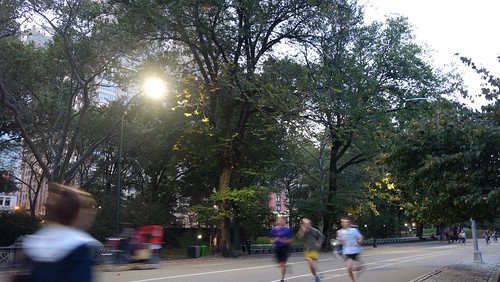Outside Online has a new article, “Eight of Our Favorite Writers on Why They Run.” They’re not simply writers who also happen to enjoy a jog; all of them see a connection between running and writing. For example, here’s nonfiction writer Peter Hessler:
I think the mentality is somewhat similar, this sort of persistence-endurance.
I always go into a piece of writing with a plan, an idea of what I want to do, but there are things that come to me as I’m working that I didn’t expect, and I have to be loose and relaxed enough to let those things in. I notice that when I run, my mind is in that place, this sort of very free-flowing, unstructured, unfocused place. For me, it’s part of the whole mental space that’s necessary to write.
Here’s Joyce Carol Oates:
Ideally, the runner who’s a writer is running through the land- and cityscapes of her fiction, like a ghost in a real setting.
The structural problems I set for myself in writing, in a long, snarled, frustrating, and sometimes despairing morning of work, for instance, I can usually unsnarl by running in the afternoon.
They generally don’t try to think about problems when they’re running, but do find it’s useful for jogging (as it were) new ideas or giving their subconscious space to think. As Poet Laureate emeritus Kay Ryan says, “Consciously thinking about what I’ll write is something I rarely do, although I may do some revising of poems in my head when I’m running.” Wired editor Nicholas Thompson says
I do notice that a lot of the best thinking I get done, or ideas generation, or problem solving, happens when I’m running and trying to focus on stuff outside of my head…. I think probably for most things I’ve written or edited, there’s been a key insight that came while I was running.
Running also teaches endurance. Here’s Kay Ryan again:
Both can be hard and unpleasant at times. But of the two, writing is much harder. When you go out for a run, you never fail, but you often fail when you set out to write a poem, even if you try your hardest.
This is not to say that all writers are runners, or vice versa. I for one greatly dislike running. I find it boring and uncomfortable, and far prefer a long walk or hike or bike ride, or a couple circuits with the weight machines.
But even if you don’t run, the article is still worthwhile because it gives a sense of how for them, running is a kind of deep play, and how deep play is important for their literary lives.
I argue at length in Rest that deep play helps people be more creative, and often seems to extend their creative careers. For some people it’s running; for others, it can be sailing, or gardening, or swimming, or painting (or other things).
What all these activities have in common is that they’re a break from work that can otherwise be unhealthily consuming, but they also sustain a person’s ability to work. They provide a physical respite and mental escape, and the means to work better. And they offer similar kinds of challenges and rewards, in very different contexts.
In today’s world, we often don’t think of hobbies as being very important (side gigs and driving for Uber don’t count); but in fact, finding your own deep play is important for having a more creative life.

